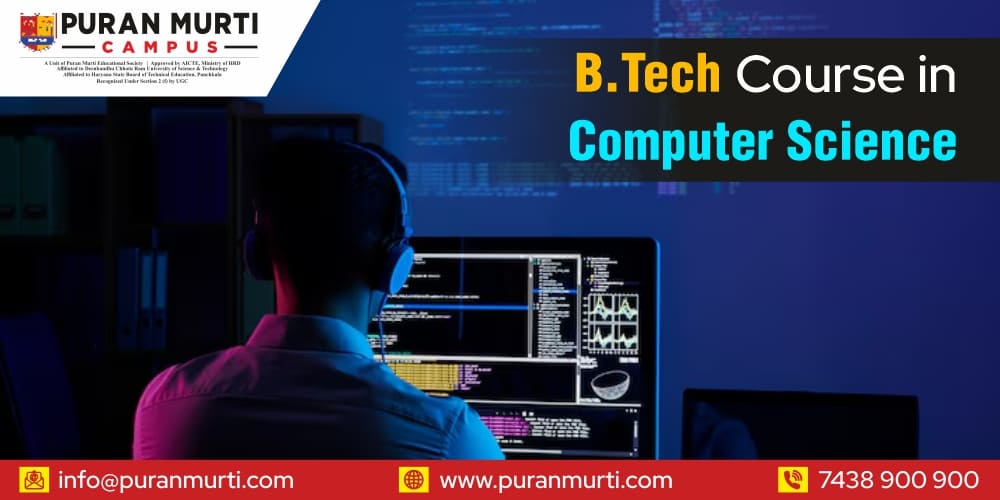Btech course in computer science
Posted on : 29 September, 2025 3:59 pm
Computer Science
Computer Science courses cover a wide range of subjects that build both theoretical knowledge and practical skills in computing. The core courses focus on programming languages, data structures, algorithms, operating systems, computer networks, and database management, which form the foundation of problem-solving and software development. Advanced courses explore areas like artificial intelligence, machine learning, data science, cloud computing, and cybersecurity, preparing students for modern industry challenges. Mathematics-based subjects such as discrete mathematics, probability, and linear algebra strengthen logical thinking and analytical skills. In addition, application-oriented courses like web development, mobile app development, and software engineering enhance practical expertise, while emerging fields such as blockchain, quantum computing, and virtual reality expose students to future technologies. Together, these courses create a balanced mix of theory, application, and innovation, equipping learners to build strong careers in technology-driven industries.
Computer Science Courses
Courses in Computer Science are designed to give students both theoretical knowledge and practical skills in the field of computing. The curriculum usually includes core subjects like programming, data structures, algorithms, operating systems, computer networks, and databases, which build a strong foundation. It also offers advanced areas such as artificial intelligence, machine learning, cybersecurity, data science, and cloud computing that prepare students for the latest industry trends. Along with this, application-oriented courses like web development, mobile app development, and software engineering help students gain hands-on experience. Emerging technologies like blockchain, Internet of Things (IoT), and virtual reality are also introduced to keep learners updated with modern innovations. Overall, Computer Science courses open up wide career opportunities by blending fundamental concepts with cutting-edge technologies.
Puran Murti Vidyapeeth
Puran Murti Vidyapeeth is a Private Education Institution located on Kami Road, Sonepat, Haryana in Delhi-NCR.
Courses in Puran Murti
Puran Murti offers a wide variety of technical, professional, and vocational programmes:
-
Engineering: B.Tech in multiple disciplines including Aeronautical Engineering, Aerospace Engineering, Civil Engineering, Mechanical, Electrical, Electronics & Communication, and specialized CSE programs (AI & ML, IoT & Cyber Security + Blockchain).
-
Postgraduate Engineering: M.Tech in fields like CSE, Civil, Mechanical, Aerospace, ECE.
-
Diploma Courses & Vocational / Trade Programmes: Diploma in Engineering branches, Aircraft Maintenance Engineering (AME), Fire Technology & Safety, Medical Lab Technician (DMLT), etc. Also ITI courses.
-
Other Professional Courses: BBA, BCA, MBA; Pharmacy (B.Pharmacy & D.Pharmacy); Law (LLB, BA-LLB); and some integrated / vocational programs.
Courses Offered in Puran Murti
| Program | Duration | Key Focus |
|---|---|---|
| B.Tech in Computer Science & Engineering (CSE) | 4 years (8 semesters) | Traditional CSE covering fundamentals like programming, data structures, systems, hardware-software interaction. |
| B.Tech CSE (Artificial Intelligence & Machine Learning) | 4 years (8 semesters) | Includes core CSE plus AI/ML topics: machine learning models, computer vision, NLP, etc. |
| Diploma in CSE | 3 years (6 semesters) | For students after 10th. More basic, includes practical & theory to give a foundation in computing and engineering. |
| M.Tech in CSE | 2 years (4 semesters) | Postgraduate—advanced topics in algorithms, systems, networks, software engineering etc. |
Computer Science Courses Details
| Phase | Typical Courses / Topics | Purpose / Skills You Gain |
|---|---|---|
| Year 1 (Semesters 1-2) | Mathematics (Calculus, Linear Algebra), Physics / Chemistry (for engineering syllabus), Basic Programming (C / C++), Communication Skills, Engineering Graphics, Workshop Practice, Electrical / Electronics Basics. | Build strong mathematical foundation, basic programming skills, scientific thinking; get used to lab work and technical communication. |
| Year 2 (Semesters 3-4) | Data Structures & Algorithms; Discrete Mathematics; Digital Logic / Electronics; Computer Organization & Architecture; Database Management Systems; Operating Systems; Probability & Statistics; Software Engineering basics; Network fundamentals. | You begin diving into how computers work internally, how data is structured, algorithmic thinking, systems programming, managing data; also start dealing with abstraction, performance, design. |
| Year 3 (Semesters 5-6) | More advanced / specialized topics: Computer Networks in depth; Web / Internet Technologies; Software Engineering; Compilers; Theory of Computation; Electives (AI, ML fundamentals, Cybersecurity, Cloud Technologies, Big Data etc.); Lab and project work. | You learn tools for larger systems, software design, scalable computing, more real-world issues like security, performance, parallelism, etc. Also more project-based work, team work. |
| Year 4 (Semesters 7-8) | More electives / specializations: AI & Machine Learning, Internet of Things (IoT), Cybersecurity, Blockchain, Cloud Computing, Data Science; Capstone projects; Internships; Software Project Management; possibly research-oriented modules. | Apply your learning, build actual systems, integrate different skills, deepen in areas you like, prepare for either industry or further study (Masters / Research). |
Specializations & Additional Skills
They provide opportunities / specialization tracks or electives in:
-
AI & ML (Artificial Intelligence & Machine Learning) track in B.Tech.
-
IoT + Cyber Security + Blockchain track.
-
Other skill-boosting additional courses like Big Data & Data Analytics, Cloud Computing, DevOps, etc

